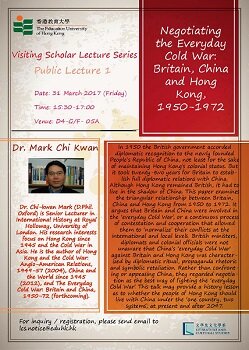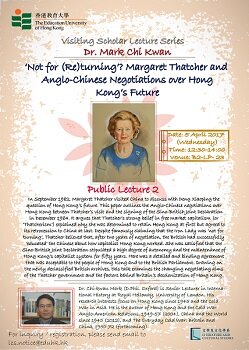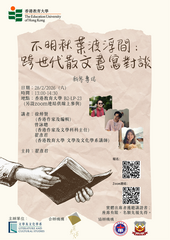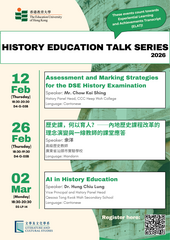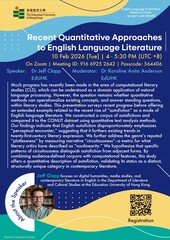Visiting Scholar Lecture Series: Negotiating the Everyday Cold War: Britain, China and Hong Kong, 1950-1972; Not for (Re)turning’? Margaret Thatcher and Anglo-Chinese Negotiations over Hong Kong’s Future
- 31 Mar, 2017 - 05 Apr, 2017 | 3:30 pm - 5:00 pm (31 Mar); 12:30 pm - 2:00 pm (5 Apr)
- D4-G/F-05A (31 Mar); B2-LP-23 (5 Apr)
- English
- Dr Chi-kwan Mark
- Department of Literature and Cultural Studies
The Department of Literature and Cultural Studies has much pleasure in welcoming Visiting Scholar Dr Mark Chi Kwan to visit us from 30th Mar–7th Apr 2017.
Dr Chi-kwan Mark (D.Phil. Oxford) is Senior Lecturer in International History at Royal Holloway, University of London. His research interests focus on Hong Kong since 1945 and the Cold War in Asia. He is the author of Hong Kong and the Cold War: Anglo-American Relations, 1949-57 (2004), China and the World since 1945 (2012), and The Everyday Cold War: Britain and China, 1950-72 (forthcoming).
During his visit, a series of public lectures will be organized:
Public Lecture 1: “Negotiating the Everyday Cold War: Britain, China and Hong Kong, 1950-1972”
Date: 31 Mar (Fri)
Time: 15:30 – 17:00
Venue: D4-G/F-05A
Abstract
In 1950 the British government accorded diplomatic recognition to the newly founded People’s Republic of China, not least for the sake of maintaining Hong Kong’s colonial status. But it took twenty-two years for Britain to establish full diplomatic relations with China. Although Hong Kong remained British, it had to live in the shadow of China. This paper examines the triangular relationship between Britain, China and Hong Kong from 1950 to 1972. It argues that Britain and China were involved in the ‘everyday Cold War’, or a continuous process of contestation and cooperation that allowed them to ‘normalize’ their conflicts at the international and local levels. British ministers, diplomats and colonial officials were not unaware that China’s ‘everyday Cold War’ against Britain and Hong Kong was characterized by diplomatic ritual, propaganda rhetoric and symbolic retaliation. Rather than confronting or appeasing China, they regarded negotiation as the best way of fighting the ‘everyday Cold War’. This talk may provide a history lesson as to whether the people of Hong Kong should live with China under the ‘one country, two systems’, at present and after 2047.
Public Lecture 2: “‘Not for (Re)turning’? Margaret Thatcher and Anglo-Chinese
Negotiations over Hong Kong’s Future”
Date: 5 Apr (Wed)
Time: 12:30 – 14:00
Venue: B2-LP-23
Abstract
In September 1982, Margaret Thatcher visited China to discuss with Deng Xiaoping the question of Hong Kong’s future. This paper outlines the Anglo-Chinese negotiations over Hong Kong between Thatcher’s visit and the signing of the Sino-British Joint Declaration in December 1984. It argues that Thatcher’s strong belief in free market capitalism (or ‘Thatcherism’) explained why she was determined to retain Hong Kong at first but agreed to its retrocession to China at last. Despite famously claiming that the Iron Lady was ‘not for turning’, Thatcher believed that, after two years of negotiation, the British had successfully ‘educated’ the Chinese about how capitalist Hong Kong worked. She was satisfied that the Sino-British Joint Declaration stipulated a high degree of autonomy and the maintenance of Hong Kong’s capitalist system for fifty years. Here was a detailed and binding agreement that was acceptable to the people of Hong Kong and to the British Parliament. Drawing on the newly declassified British archives, this talk examines the changing negotiating aims of the Thatcher government and the factors behind Britain’s decolonization of Hong Kong.
Kindly indicate your participation by replying this email one day before the Public Lecture. All are welcome. We look forward to your participation.
For enquiry / registration, please email lcs.notice@eduhk.hk
